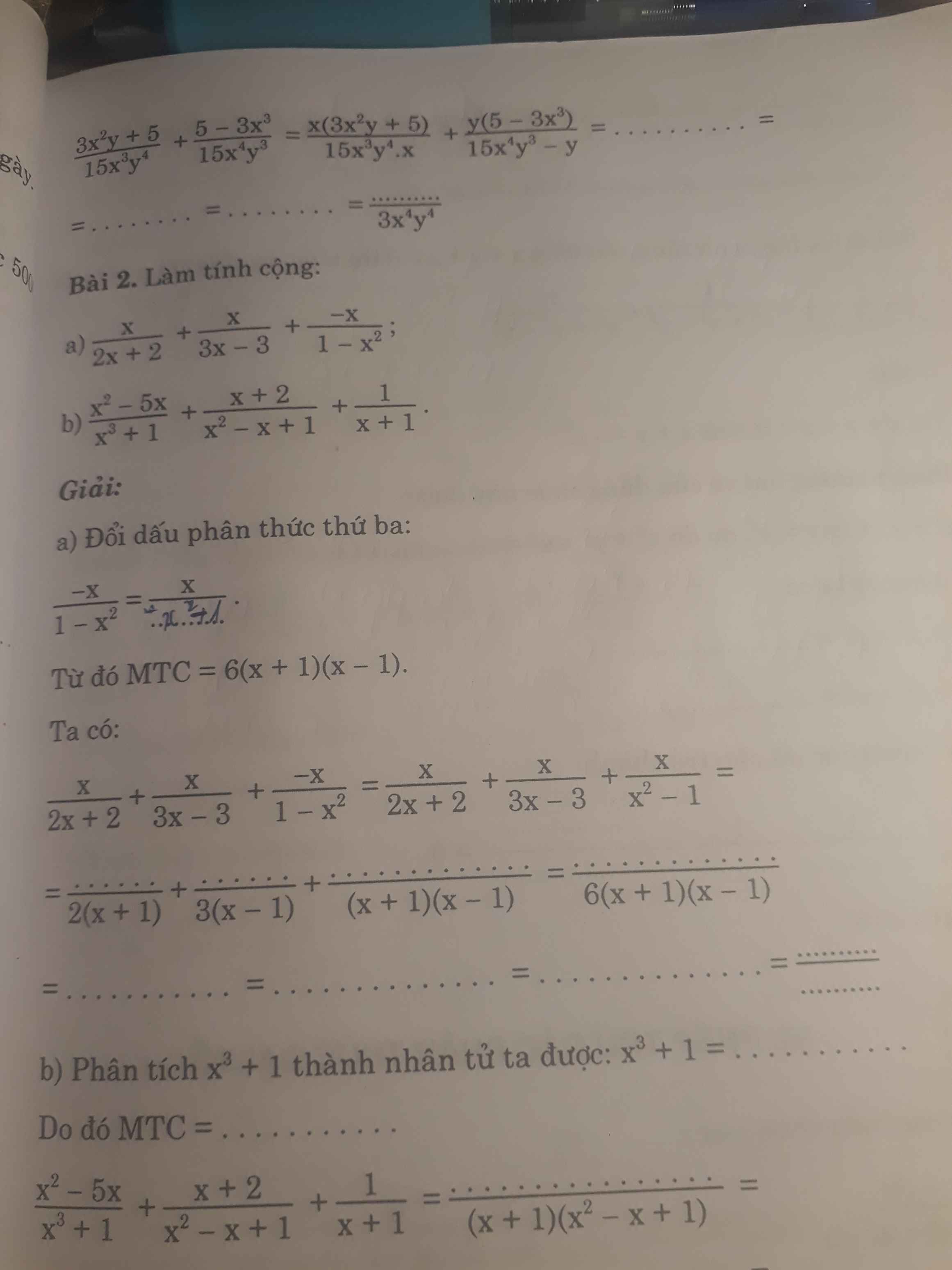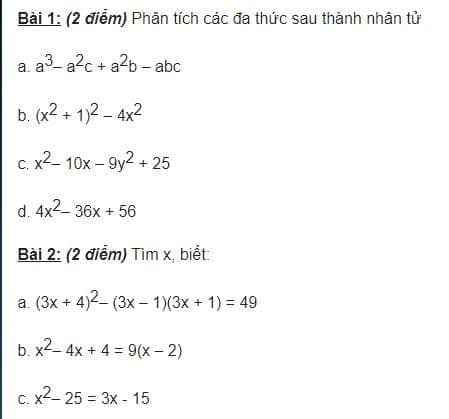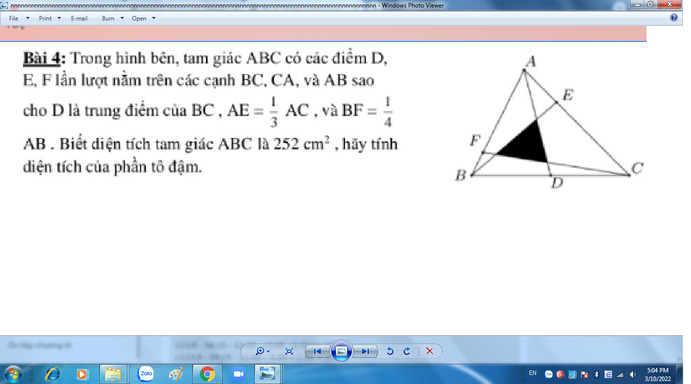
Hãy nhập câu hỏi của bạn vào đây, nếu là tài khoản VIP, bạn sẽ được ưu tiên trả lời.


Bài 1:
Vận tốc cano khi dòng nước lặng là: $25-2=23$ (km/h)
Bài 2:
Đổi 1 giờ 48 phút = 1,8 giờ
Độ dài quãng đường AB: $1,8\times 25=45$ (km)
Vận tốc ngược dòng là: $25-2,5-2,5=20$ (km/h)
Cano ngược dòng từ B về A hết:
$45:20=2,25$ giờ = 2 giờ 15 phút.

Bài 1:
a.
$a^3-a^2c+a^2b-abc=a^2(a-c)+ab(a-c)$
$=(a-c)(a^2+ab)=(a-c)a(a+b)=a(a-c)(a+b)$
b.
$(x^2+1)^2-4x^2=(x^2+1)^2-(2x)^2=(x^2+1-2x)(x^2+1+2x)$
$=(x-1)^2(x+1)^2$
c.
$x^2-10x-9y^2+25=(x^2-10x+25)-9y^2$
$=(x-5)^2-(3y)^2=(x-5-3y)(x-5+3y)$
d.
$4x^2-36x+56=4(x^2-9x+14)=4(x^2-2x-7x+14)$
$=4[x(x-2)-7(x-2)]=4(x-2)(x-7)$
Bài 2:
a. $(3x+4)^2-(3x-1)(3x+1)=49$
$\Leftrightarrow (3x+4)^2-[(3x)^2-1]=49$
$\Leftrightarrow (3x+4)^2-(3x)^2=48$
$\Leftrightarrow (3x+4-3x)(3x+4+3x)=48$
$\Leftrightarrow 4(6x+4)=48$
$\Leftrightarrow 6x+4=12$
$\Leftrightarrow 6x=8$
$\Leftrightarrow x=\frac{4}{3}$
b. $x^2-4x+4=9(x-2)$
$\Leftrightarrow (x-2)^2=9(x-2)$
$\Leftrightarrow (x-2)(x-2-9)=0$
$\Leftrightarrow (x-2)(x-11)=0$
$\Leftrightarrow x-2=0$ hoặc $x-11=0$
$\Leftrightarrow x=2$ hoặc $x=11$
c.
$x^2-25=3x-15$
$\Leftrightarrow (x-5)(x+5)=3(x-5)$
$\Leftrightarrow (x-5)(x+5-3)=0$
$\Leftrightarrow (x-5)(x+2)=0$
$\Leftrightarrow x-5=0$ hoặc $x+2=0$
$\Leftrightarrow x=5$ hoặc $x=-2$

Áp dụng phương pháp hệ số bất định ta có
x4-6x3+12x2-14x+3
= (x2+ax+b)(x2+cx+d)
= x4 + (a+c)x3+(ac+b+d)x2+(ad+bc)x+bd
Đồng nhất đa thức trên với đề bài ta có
\(\left[{}\begin{matrix}a+c=-6\\ac+b+d=12\\ad+bc=-14\\bd=3\end{matrix}\right.\)
\(\Rightarrow\left[{}\begin{matrix}a=-2\\b=3\\c=-4\\d=1\end{matrix}\right.\)
Thế a,b,c,d ta được
x4-6x3+12x2-14x+3
= (x2+ax+b)(x2+cx+d)
= (x2-2x+3)(x2-4x+1)
Bài 2
1/ \(\dfrac{x-342}{15}+\dfrac{x-323}{17}+\dfrac{x-300}{19}+\dfrac{x-273}{21}=10\)
\(\Leftrightarrow\dfrac{x-342}{15}-1+\dfrac{x-323}{17}-2+\dfrac{x-300}{19}-3+\dfrac{x-273}{21}-4=0\)\(\Leftrightarrow\dfrac{x-357}{15}+\dfrac{x-357}{17}+\dfrac{x-357}{19}+\dfrac{x-357}{21}=0\)
\(\Leftrightarrow\left(x-357\right)\left(\dfrac{1}{15}+\dfrac{1}{17}+\dfrac{1}{19}+\dfrac{1}{21}\right)=0\)
Mà \(\dfrac{1}{15}+\dfrac{1}{17}+\dfrac{1}{19}+\dfrac{1}{21}>0\)
\(\Rightarrow x-357=0\Leftrightarrow x=357\)
2/ Ta có: \(\left(x-y\right)^2+\left(y-z\right)^2+\left(z-x\right)^2\ge0\)
\(\Leftrightarrow x^2+y^2+z^2-xy-yz-zx\ge0\)
\(\Leftrightarrow\left(x+y+z\right)^2\ge3\left(xy+yz+zx\right)\)
\(\Leftrightarrow\dfrac{\left(x+y+z\right)^2}{3}\ge xy+yz+zx\)
\(\Leftrightarrow xy+yz+zx\le3\)
\(\Rightarrow\) GTLN của B là 3
Dấu ''='' xảy ra khi và chỉ khi \(x=y=z=1\)

a.) \\(\\left(a+b+c\\right)^3-a^3-b^3-c^3\\)
\\(=a^3+b^3+c^3+3a^2b+3ab^2+3a^2c+3ac^2+3b^2c+3bc^2+6abc-a^3-b^3-c^3\\)\\(=3\\left(3a^2b+3ab^2+3a^2c+3ac^2+3b^2c+3bc^2+6abc\\right)\\)
\\(=3\\left(abc+a^2b+a^2c+ac^2+b^2c+ab^2+abc+bc^2\\right)\\)
\\(=3\\left[ab\\left(a+c\\right)+ac\\left(a+c\\right)+b^2\\left(a+c\\right)+bc\\left(a+c\\right)\\right]\\)
\\(=3\\left(a+c\\right)\\left(ab+ac+bc+b^2\\right)\\)
\\(=3\\left(a+c\\right)\\left[a\\left(b+c\\right)+b\\left(b+c\\right)\\right]\\)
\\(=3\\left(a+c\\right)\\left(a+b\\right)\\left(b+c\\right)\\)
b) 4a2b2-(a2 +b2-c2)2
=(2ab+a2+b2-c2)(2ab-a2-b2+c2)
=[(a+b)2-c2][c2-(a-b)2]
=(a+b+c)(a+b-c)(c+a-b)(c-a+b)
a) \(\left(a+b+c\right)^3-a^3-b^3-c^3\)
\(=a^3+b^3+c^3+3ab\left(a+b\right)+3bc\left(b+c\right)+3ca\left(c+a\right)+6abc-a^3-b^3-c^3\)
\(=3ab\left(a+b\right)+3bc\left(b+c\right)+3ca\left(c+a\right)+6abc\)
\(=3\left(ab\left(a+b\right)+bc\left(b+c\right)+ca\left(c+a\right)+2abc\right)\)
\(=3\left(ab\left(a+b\right)+b^2c+abc+bc^2+c^2a+ca^2+abc\right)\)
\(=3\left(ab\left(a+b\right)+bc\left(a+b\right)+c^2\left(a+b\right)+ac\left(a+b\right)\right)\)
\(=3\left(a+b\right)\left(ab+bc+c^2+ac\right)\)
\(=3\left(a+b\right)\left[b\left(a+c\right)+c\left(a+c\right)\right]\)
\(=3\left(a+b\right)\left(a+c\right)\left(b+c\right)\)

Câu 4:
a: ĐKXĐ: \(x\notin\left\{0;-5\right\}\)
b: \(A=\dfrac{x^2+2x}{2\left(x+5\right)}+\dfrac{x-5}{x}+\dfrac{50-5x}{2x\left(x+5\right)}\)
\(=\dfrac{x^3+2x^2}{2x\left(x+5\right)}+\dfrac{2\left(x^2-25\right)}{2x\left(x+5\right)}+\dfrac{50-5x}{2x\left(x+5\right)}\)
\(=\dfrac{x^3+2x^2+2x^2-50+50-5x}{2x\left(x+5\right)}\)
\(=\dfrac{x^3+4x^2-5x}{2x\left(x+5\right)}=\dfrac{x\left(x^2+4x-5\right)}{2x\left(x+5\right)}\)
\(=\dfrac{x\left(x+5\right)\left(x-1\right)}{2x\left(x+5\right)}=\dfrac{x-1}{2}\)
c: Để A=-3 thì x-1=-6
hay x=-5(loại)

Điều kiện:
\(x-1\ne0\Rightarrow x\ne1\)
\(x^3+x\ne0\Leftrightarrow x\ne0\)

Đặt tính \(2n^2-n+2\) : \(2n+1\) sẽ bằng n - 1 dư 3
Để chia hết thì 3 phải chia hết cho 2n + 1 hay 2n + 1 là ước của 3
Ư(3) = {\(\pm\) 3; \(\pm\) 1}
\(2n+1=1\Leftrightarrow2n=0\Leftrightarrow n=0\)
\(2n+1=-1\Leftrightarrow2n=-2\Leftrightarrow n=-1\)
\(2n+1=3\Leftrightarrow2n=2\Leftrightarrow n=1\)
\(2n+1=-3\Leftrightarrow2n=-4\Leftrightarrow n=-2\)
Vậy \(n=\left\{0;-2;\pm1\right\}\)







2:
a)x / 2x+2 + x / 3x-3 + -x / 1-x2
= x / 2(x+1) + x / 3(x-1) + x / x2-1
= x(x-1) / 2(x+1)(x-1) + x(x+1) / 3(x-1)(x+1) + x / (x-1)(x+1)
= 3x(x-1) / 6(x+1)(x-1) + 2x(x+1) / 6(x+1)(x-1) + 6x / 6(x+1)(x-1)
= 3x(x-1) + 2x(x+1) + 6x / 6(x+1)(x-1)
= 3(x2-x) + 2(x2+x) + 6x / 6(x+1)(x-1)
= 3x2 - 3x + 2x2 + 2x + 6x / 6(x+1)(x-1)
= 5x2 + 5x / 6(x+1)(x-1)
= 5x(x+1) / 6(x+1)(x-1)
= 5x / 6(x-1) = 5(x-1) + 5 / 6(x-1)
= 5(x-1) / 6(x-1) + 5 / 6(x-1)
= 5/6 + 5 / 6(x-1)
b)x2-5x / x3+1 + x+2 / x2-x+1 + 1 / x+1
= x2-5x / x3+1 + (x+2)(x+1)+x2-x+1 / (x2-x+1)(x+1)
= x2-5x / x3+1 + x2+3x+2+x2-x+1 / x3+1
= x2-5x+x2+3x+2+x2-x+1 / x3+1
= 3x2-3x+3 / (x2-x+1)(x+1)
= 3(x2-x+1) / (x2-x+1)(x+1) = 3 / x+1